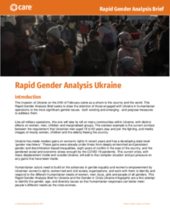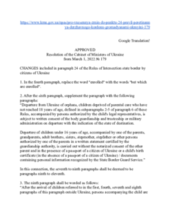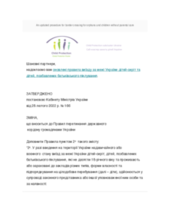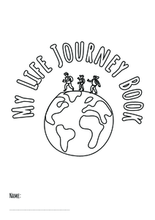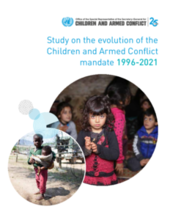Displaying 161 - 170 of 516
This Rapid Gender Analysis Brief seeks to draw the attention of those engaged with Ukraine in humanitarian operations to the most significant gender issues both existing and emerging and propose measures to address them.
The Cabinet of Ministers of Ukraine introduced a modification of item 24 of "Rules of crossing of the state border by citizens of Ukraine". This is an unofficial English Google Translation of the original document published in Ukrainian which is included on Page 2 of this document.
Acest cod de conduită urmează să fie utilizat în timpul răspunsului de urgență al Republicii Moldova la criza din Ucraina. Ar trebui să fie susținut de toți adulții și copiii de peste 12 ani.
The Government of Ukraine released this updated procedure for border crossing for orphans and children without parental care.
The report shows that, overall, although legislative changes have taken place in many Member States, national guardianship systems continue to face many challenges. The guardianship systems also still vary greatly across the EU.
This video by the Alliance for for Child Protection in Humanitarian Action details the main reasons for investing in child protection prevention programming in humanitarian crises.
The Toolkit is intended for field practitioners working with Children Associated with Armed Forces and Armed Groups (CAAFAG), who are interested in designing and implementing quality, gender-sensitive and participatory programming.
Since the start of war in Ukraine, more than 4 million people have fled, half of whom are children. As of today there is the Mylifejourneybook for these children: an activity book in which children can write their experiences of the journey, but also their memories of Ukraine and their hopes for the future. The book can be downloaded free of charge for everyone at www.lifebookforyouth.com/mylifejourneybook
In this essay, after providing some data regarding Ukrainian families and minors who fled their country after the Russian invasion and moved to Italy, the authors will focus on the extraordinary effort made to improve reception programs, on the peculiar condition of minors who reached our country accompanied by adults who were not their parents, and finally on the experience of placing these fleeing families into Italian households.
This study looks at the results achieved under the mandate of the Special Representative of the Secretary-General for Children and Armed Conflict (SRSG CAAC) in the past 25 years, the challenges that impacted its implementation and the opportunities to improve the protection of children affected by conflict.

